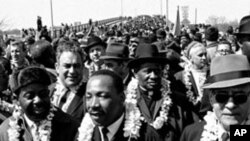This past weekend was supposed to be the official unveiling of the memorial to civil rights leader Dr. Martin Luther King in Washington DC. But plans were scuttled after warnings that Hurricane Irene was looming over the East Coast.
The tribute is the first to an African American leader on the large expanse of lawn called the National Mall. The site is a four-acre tract with a 30-foot sculpture of the civil rights leader. Surrounding it are the memorials to presidents Thomas Jefferson and Abraham Lincoln.
Admirers of King raised nearly $120 million in private funds. They hope it will inspire millions to respect the goal of equal rights for all peoples, not only in the United States but around the world.
Among the admirers is Kenyan scholar Professor Ali Mazrui, a holder of the Albert Schweitzer Chair in the Humanities and the director of the Institute of Global Cultural Studies at Binghamton University in New York. In the early 1960s, he was a graduate student at Columbia University staying at International House, a residence for specially selected international graduate students of several New York City institutions of higher learning.
One night, a small number of students from I-House, as it’s called, were invited to a dinner that was to be addressed by the civil rights leader. Mazrui says later that evening, he talked with King about Kenya – especially its early days of independence, and Tom Mboya, an influential labor leader and government minister. In 1959, Mboya helped 81 Kenyan students go to the United States for university study. Among them was the father of President Barack Obama.
“[King] knew quite a bit about Kenya,” said Mazrui. “We discussed its march towards independence. He knew of Mboya, the second most famous Kenyan at the time, and they knew each other very well. In retrospect, it was very sad that both were assassinated. That was a fate they shared, eventually.”
In 1964, King became the youngest person to receive the Nobel Peace Prize for his work to end racial segregation and discrimination through civil disobedience and other nonviolent means.
Mazrui said Africa’s movements for independence and the American civil rights movement had much in common.
“They were interrelated,” he said, “which was part of the awakening of the underprivileged, because the 1960s especially were the most preeminent decade of protests by the underprivileged throughout the world.”
He said the decade included the fight against colonialism and the civil rights movement, and these were in many ways the most historic and long enduring. But it also brought the fight against the war in Vietnam, the student movements in many parts of the world, the radicalization of issues of sexual mores and the beginnings of the feminist movement.




